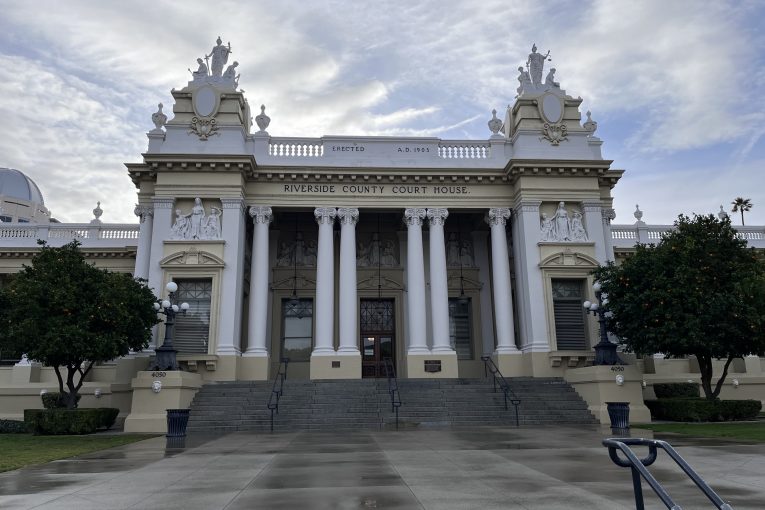

By David M. Greenwald
Executive Editor
Riverside, CA – Nearly a year after a Riverside judge denied a motion to strike the death penalty under the Racial Justice Act, the California Fourth District Court of Appeal reversed the judge’s decision, allowing two Black men to move forward with their challenge to death penalty prosecutions being sought against them.
Lawyers for Russell Austin and Michael Mosby argued that the death penalty in Riverside  County is tainted with racial inequality—and offered statistical studies, along with other evidence, reaching that conclusion.
County is tainted with racial inequality—and offered statistical studies, along with other evidence, reaching that conclusion.
The court ruled that Mr. Austin and Mr. Mosby met their initial burden and can continue their challenge, ordering the trial court to hold an evidentiary hearing.
This will allow an evidentiary hearing where Austin and Mosby will be able to present witnesses and evidence of racial disparities in the administration of the death penalty in Riverside County.
Riverside Judge Denies Motion to Strike Death Penalty under Racial Justice Act
“This is exactly how the California Racial Justice Act is meant to work. The initial threshold to obtain an evidentiary hearing to prove our case under the CRJA should be easy to meet. The CRJA can only be effective if it is readily accessible to people whose cases are negatively impacted by systemic racial bias,” said Claudia Van Wyk, a senior staff attorney at the ACLU Capital Punishment Project.
She added, “Our system of justice should take such challenges seriously and allow them to have a full hearing. That is the purpose of the CRJA: to stamp out racial inequality in the administration of justice. We cannot fear too much justice.”
Last year, Van Wyk showed convincing evidence that the death penalty was disproportionately charged against Black defendants even when white defendants had similarly situated crimes.
However, the district attorney’s office led by Deputy DA Matt Murray, countered that “the defendants here, as defined in Penal Code section 745(h)(6), were treated more leniently than defendants of other races.” They added that the defense analysis of PC 745 “would defy the intent of the statute.”
At issue were whether the DA could charge two separate defendants—Russell Austin and Michael Mosby—with the death penalty or whether the history of disparate treatment under the Racial Justice Act precluded the state from seeking the death penalty.
“In the process of deciding who winds up on death row in Riverside County, Black people are treated unequally at every step of the way from arrest all the way to death row when compared with white people,” stated Claudia Van Wyk from the ACLU Capital Punishment Project, who along with the Public Defender’s Office and ACLU of Southern California are representing the two men in this case.
Van Wyk explained that “for our two clients, we are seeking a hearing and a chance to prove that, um, the death penalty has been unequally applied to them.”
They have gathered experts and done a detailed analysis.
“They ran the numbers four different ways, and whatever way you count, it tells the same story at every step,” she explained. “Black people are more likely to receive more punitive treatment than white people.”
Judge Schwartz didn’t disagree with that assessment.
However, he saw it as a twofold analysis under PC section 745.
“One is statistical,” the judge explained. “The other is viewing persons who are in a similar situation, having committed similar conduct as to whether or not there’s a disparity in their treatment.”
He said, “Clearly, the first element, as I mentioned at our last hearing, I believe has been met.”
Now, the defense will get another chance to make the case that the death penalty should be excluded from this case.
Following the Appellate Court Ruling, Van Wyk said, “We are confident that we will present compelling evidence and witnesses to show that the administration of the death penalty in Riverside County is tainted by systemic racial bias. That entitles our clients to relief under the California Racial Justice Act.”
“Mr. Austin and Mr. Mosby are the first individuals facing capital prosecution who have been granted evidentiary hearings under the California Racial Justice Act.,” said Robert Ponce, Capital Punishment Project fellow at the ACLU Foundation of Southern California.
He added, “The CRJA forged a path for members of our communities to pursue justice within a legal system historically tainted by racial discrimination. All people in California — Mr. Austin and Mr. Mosby included — deserve access to a legal system that acknowledges the legacies and ongoing harm caused by systemic racial bias.”

